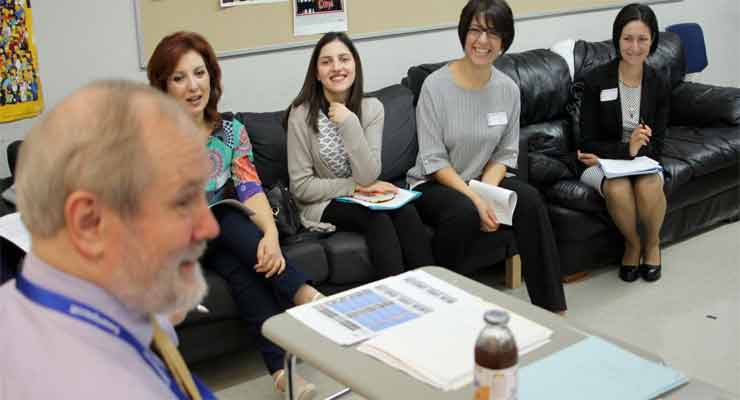SWAMPSCOTT — Five Armenian educators were hosted by Swampscott High School on Thursday to learn about how the school teaches media literacy.
The women visited the school as part of their nine-day trip to Greater Boston through a grant program focused on media literacy in education hosted by the Cambridge-Yerevan Sister City Association (CYSCA), with funding support from the “Open World” Program of the U.S. Library of Congress, CYSCA and its team of volunteers. Yerevan is the capital city of Armenia.
Thomas Reid, media literacy teacher at Swampscott High School, hosted the educators who sat in on his classes and engaged with students.
Reid said one of the goals of media literacy is to understand multiple perspectives and points of view. He said he wanted his students to hear the points of view of the Armenian educators and also have the students share their perspectives with the guests. He said he was also interested in the visit because he likes helping fellow teachers.
His classes on Thursday involved showing a trailer for Moonlight, which won the Oscar for Best Picture this year and hosting a guest speaker, who gave an interactive presentation on “Fake News.”
Lusine Grigoryan, a media literacy specialist visiting from Armenia, said the subject is still new in her country, and that some schools are trying to incorporate media literacy as a subject or as part of social studies classes. Although many schools teach media literacy now in Armenia, she said it’s not part of a national curriculum.
A key goal of the program, initiated by Open World through the U.S. Embassy in Armenia, is to help participants develop methods for inclusion of media literacy in education by engaging them with their American counterparts. The program also exposes the Armenian professionals to America’s democratic government and free-market system, according to a press release from the CYSCA.
Grigoryan said the visitors wanted to see what Swampscott High School and other schools and colleges were doing with the subject and maybe take those best practices back to Armenia.
Grigoryan said they arrived in Washington, D.C. on Sept. 27 and made it to Boston two days later. She said their trip has included going to different colleges, Cambridge Public Schools, WGBH, and meeting with a state representative, who is promoting a bill for media education.
“We wanted to see their teaching in school (and) what type of methods they’re doing,” Grigoryan said. “We thought it would be very useful to see ourselves how they’re doing it. It’s always useful to get another perspective.”
Reid said he’s part of an organization, Media Literacy Now, that advocates for media literacy in schools. He said someone in that group recommended him as a facilitator for the program. Besides Swampscott, he said the visitors only went to one other high school, in Cambridge.
Alisa Stepanian, CYSCA president, said all of the Armenian visitors have a background or knowledge of media literacy — one is a teacher, two are smart room coordinators, Grigoryan is a media literacy specialist for the Media Initiatives Center, and another woman works for the Goris Press Club NGO. The facilitator and translator for the group is Anahit Khachatryan, who is with the U.S. Embassy.
“The purpose is to meet their counterparts in the U.S. and learn how media literacy is handled in education in the U.S. and learn some tools they can hopefully implement back home,” Stepanian said.
She said the group met with a state representative in Massachusetts who is a proponent of a bill that mandates that media literacy be taught across the state. She said they met with nonprofits, schools and the government. Stepanian said the visitors are hoping to have media literacy as part of the education curriculum in Armenia — legislation would have to be passed on that in their country.
“They’ve commented that this has been a very fruitful trip,” Stepanian said. “They gained a lot of information and contacts.”
The group’s stay in Greater Boston, scheduled from Sept. 29 to Oct. 7, also included a visit to Cambridge Public Schools, Massachusetts Media Literacy Consortium, Emerson College, University of Massachusetts Boston, and Massachusetts Institute of Technology’s media lab.

 By
By